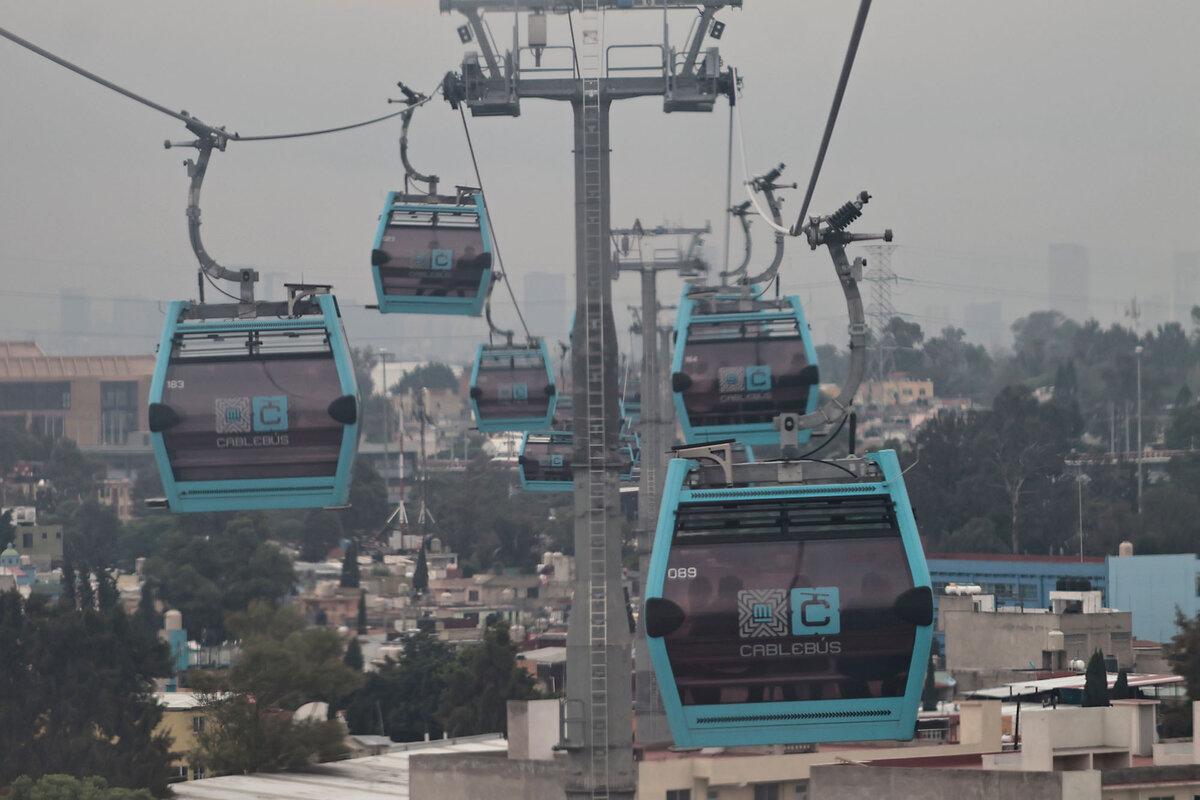Gondolas solve a last-mile problem in Mexico City, and the fixer-uppers of Scotland
Loading...
Cable cars are connecting marginalized neighborhoods across Mexico City
The Cablebús system, inaugurated in 2021, is moving working-class people closer to subways and buses linked to the city center, slashing commute times.
Three lines of electric gondolas cover 16 miles and transport 80,000 people every day – around twice as many people as the gondola systems in Medellín, Colombia, and Caracas, Venezuela.
Why We Wrote This
In our progress roundup, neglect is repaired by easing commutes for some of Mexico City’s working-class neighborhoods, turning abandoned Scottish homes into dream houses, and electing a record number of Indigenous representatives in Brazil.
While critics continue to push for improvements to the city’s subway system, users say the gondolas feel safer than local buses and are transforming neighborhoods. “More kids are signing up for our classes,” said a teacher at a community center in Tlalpexco, which has one of the last stations on the first Cablebús line. “We went from being a marginalized area to an important educational center.”
Source: Bloomberg
A record number of Indigenous people were elected in Brazil’s latest municipal elections
Indigenous mayors, vice mayors, and city councilors won 256 seats in the elections Oct. 6, compared with 236 in 2020. Advocates expect the trend to continue for state and federal elections come 2026.
Indigenous politicians say they continue to face prejudice. Political representation is one step forward. “Beyond starting a process of historical reparation, it’s bringing to light that we really do exist and resist,” said Ingrid Sateré Mawé, an Indigenous politician recently elected as a city councilor in Florianópolis – a first for the city. In 2023, President Luiz Inácio Lula da Silva appointed Brazil’s first minister of Indigenous peoples, Sônia Guajajara.
Source: Mongabay
Scotland’s abandoned properties are being transformed into livable homes
Over 46,000 homes across Scotland sit empty, while nearly 130,000 people wait for social housing. The Scottish Empty Homes Partnership, a collaboration between the Scottish government and housing charity Shelter, has brought over 10,800 empty homes back into use since 2010, including almost 1,900 over the past year. On the Isle of Lewis, one couple’s house had been empty since the 1940s; they’ve gained seven neighbors since creating their dream home.
Program officers connect property owners with grants, tax rebates, discounts, and expert advice to make renovations more feasible. “Using empty homes won’t be the sole solution [to the housing shortage],” said the partnership’s national manager, Tahmina Nizam, but it is one “key response that means there’s less pressure on just relying on new buildings.” Nearly one-fifth of the repurposed homes have become affordable housing.
Source: Reasons to be Cheerful
Bengal tigers are rebounding in the Sundarbans, the world’s largest mangrove forest
Numbers for Bangladesh are up 10% from 2018 and 18% from 2015, according to the latest data. Using camera traps in more than 600 locations, researchers surveyed half the land area of the Sundarbans. Footprints and images showed evidence of 84 adult tigers, with an estimated total of 125.
A government-led conservation campaign is helping preserve habitat with nylon netting to keep humans and tigers separated, and with more patrols against poaching. Last year, researchers found an increase in the populations of prey animals, indicating a healthy ecosystem for tigers. A 2023 survey counted 5,575 wild tigers globally. Four neighboring countries – Bangladesh, India, Nepal, and Bhutan – all reported recent increases in their tiger populations.
Source: Mongabay
Scientists have created a “living” plastic that self-destructs
A bottle made of regular plastic can take 450 years to decompose. In 2016, researchers at Kyoto University in Japan discovered Ideonella sakaiensis, a bacterium whose enzymes digest polyethylene terephthalate, or PET, a petroleum-based plastic found in many household items.
Now, a team at the Chinese Academy of Sciences has engineered bacterial spores that can be embedded directly into polycaprolactone plastic, which is widely used in medical care. Those spores produce the enzymes that break the plastic particles down after 30 days. The material is not in use outside the lab, but testing suggests it is a promising candidate for packaging materials such as beverage bottles.
Sources: Good Good Good, Nature Chemical Biology









